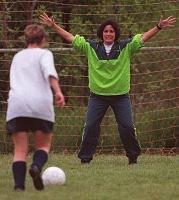Oh, Mr. Yagoda, if you only knew...
One of the things people either love or hate about law school is the minute focus on language--sometimes going all the way down to the level of individual words (e.g. what the meaning of "is" is). If you don't like that sort of thing, it seems nit-picky and meaningless, but if you're built for it, it seems really cool. Now I'm a language geek from way back, so I always enjoy articles about how new words and phrases develop, but this one from Slate about how "need to" has supplanted other words used to convey an imperative is especially great.
The term "kindergarten imperative tense" alone is worth reading the article for, but here's the best part: how Maslow's Hierarchy of Needs plays into the deal. Here's a quote from the article about how wide-ranging the effects of this particular psychological paradigm really are:
The notion, tinkered with by Maslow until his death in 1970, had traction and then some. It led to a new and now-dominant meaning for the adjective "needy"—more or less the antonym of "emotionally self-sufficient"—and to a paradigm shift in both popular and academic psychology. I once overheard an undergraduate remark to a friend that she had been taught about Maslow's Hierarchy of Needs in every single college class she had taken.
The author, Ben Yagoda, little knows how right he is. If you've never heard of Maslow's Hierarchy of Needs, then you were obviously not a member of the VHS debate team between the years of 1987-1990. Much like that unnamed undergrad, I think I heard about Maslow's Hierarchy of Needs in every single debate round I ever participated in.
Congratulations, Kellus--today you are vindicated. I guess next week Slate will have to post an article about Skinner boxes...
The term "kindergarten imperative tense" alone is worth reading the article for, but here's the best part: how Maslow's Hierarchy of Needs plays into the deal. Here's a quote from the article about how wide-ranging the effects of this particular psychological paradigm really are:
The notion, tinkered with by Maslow until his death in 1970, had traction and then some. It led to a new and now-dominant meaning for the adjective "needy"—more or less the antonym of "emotionally self-sufficient"—and to a paradigm shift in both popular and academic psychology. I once overheard an undergraduate remark to a friend that she had been taught about Maslow's Hierarchy of Needs in every single college class she had taken.
The author, Ben Yagoda, little knows how right he is. If you've never heard of Maslow's Hierarchy of Needs, then you were obviously not a member of the VHS debate team between the years of 1987-1990. Much like that unnamed undergrad, I think I heard about Maslow's Hierarchy of Needs in every single debate round I ever participated in.
Congratulations, Kellus--today you are vindicated. I guess next week Slate will have to post an article about Skinner boxes...




